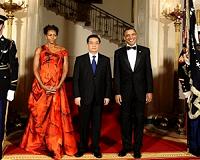| . |  |
. |
Washington (AFP) Jan 20, 2011 Chinese President Hu Jintao, unbowed by pressure on a state visit, warned the United States on Thursday not to press on Taiwan and Tibet as he insisted that the rising Asian power sought cooperation. A day after a gala dinner at the White House, Hu had a frostier reception as he visited Capitol Hill where top US lawmakers pressed him on economic and human rights concerns including the jailing of Nobel laureate Liu Xiaobo. Hu afterward delivered a speech to US business and political leaders in which he urged "mutual respect" and said: "The China-US relationship is not one in which one side's gain means the other one's loss." The Chinese leader said that Taiwan and Tibet "concern China's sovereignty and territorial integrity and they represent China's core interests." "A review of the history of our relations tells us that US-China relations will enjoy smooth and steady growth when the two countries handle well issues involving each other's major interests," Hu said. "Otherwise our relations will suffer constant trouble or even tension," he warned. Beijing considers Taiwan, a self-governing island founded by China's defeated nationalists, and Tibet, a largely Buddhist territory where China sent troops in 1950, to be integral parts of the country. President Barack Obama, at a joint news conference with Hu on Wednesday, reaffirmed the US position that Taiwan and Tibet are part of China. But he also urged China to engage with Tibet's exiled spiritual leader the Dalai Lama, who is widely popular in the United States, and recommitted the United States to helping Taiwan defend itself against China's growing military. The United States and its allies, particularly Japan, have repeatedly voiced concern about China's double-digit growth in defense spending. China tested a stealth fighter this month just as US Defense Secretary Robert Gates visited. Hu dismissed worries, saying: "We do not engage in arms races or pose a military threat to any country. China will never seek hegemony or pursue an expansionist policy." However, much of Hu's speech was conciliatory. He urged cooperation between the world's largest developed and developing nations on issues from reviving the moribund Doha trade liberalization talks to fighting climate change. "China and the United States should pursue global cooperation as partners to fulfill common responsibilities and meet common challenges," Hu said. He also said China sought to work with the United States around Asia, despite unease in Japan and Southeast Asian nations about Chinese assertiveness in recent months over myriad territorial disputes. "We should stay committed to promoting peace, stability and prosperity in the Asia-Pacific region, engage in open and inclusive regional cooperation and turn the Asia-Pacific into an important region where China and the United States work closely together on the basis of mutual respect," Hu said. Hu earlier met with Obama's nemesis John Boehner, the newly installed House speaker, who said that he had "a good meeting" with Hu that focused heavily on "our economic relationship." "I did express my concerns about religious liberty. I expressed my concerns about intellectual property and the issue of North Korea. The president responded. And I would hope that the dialogue on all of these subjects will continue," Boehner, who did not detail Hu's answers, told reporters. Democratic House Minority Leader Nancy Pelosi, a longtime advocate for human rights in China, said she raised concerns about the imprisonment of Liu Xiaobo and restrictions on the dissident's wife, who was not allowed to go to Oslo last month to accept his Nobel Peace Prize. Senate Majority Leader Harry Reid, also a Democrat, said he spoke with Hu about China's currency which many US lawmakers allege is deliberately undervalued to fuel a flood of exports, killing off US manufacturing jobs. Hu hit back at criticism during his speech, citing an unspecified study that stated that "quality yet inexpensive products" from China have saved US consumers 600 billion dollars over the past 10 years. Hu will on Friday visit Chicago, Obama's hometown, where he is expected to showcase a Chinese factory to demonstrate that his country is creating jobs. China and the United States signed $45 billion in trade deals during Hu's trip. Mindful of China's image, China has also broadcast commercials on major US television networks aiming to show China as a nation of rich culture and advanced technology. Busloads of Chinese students waved flags to cheer on Hu as he delivered the speech at a heavily guarded hotel. But protesters were also out in force, with hundreds waving Tibetan flags and chanting for Hu to "free Tibet."
Share This Article With Planet Earth
Related Links Learn about the Superpowers of the 21st Century at SpaceWar.com Learn about nuclear weapons doctrine and defense at SpaceWar.com
 Obama summons pageantry for China's Hu
Obama summons pageantry for China's HuWashington (AFP) Jan 19, 2011 US President Barack Obama lays on the grandeur of a state visit for China's Hu Jintao Wednesday, in a meeting likely to merely put a cordial gloss on glaring differences between two great powers. President Hu will be welcomed to the White House with full military honors, before Oval Office talks certain to dig down into broad areas of disagreement including currency policy, human rights and ... read more |
|
| The content herein, unless otherwise known to be public domain, are Copyright 1995-2010 - SpaceDaily. AFP and UPI Wire Stories are copyright Agence France-Presse and United Press International. ESA Portal Reports are copyright European Space Agency. All NASA sourced material is public domain. Additional copyrights may apply in whole or part to other bona fide parties. Advertising does not imply endorsement,agreement or approval of any opinions, statements or information provided by SpaceDaily on any Web page published or hosted by SpaceDaily. Privacy Statement |